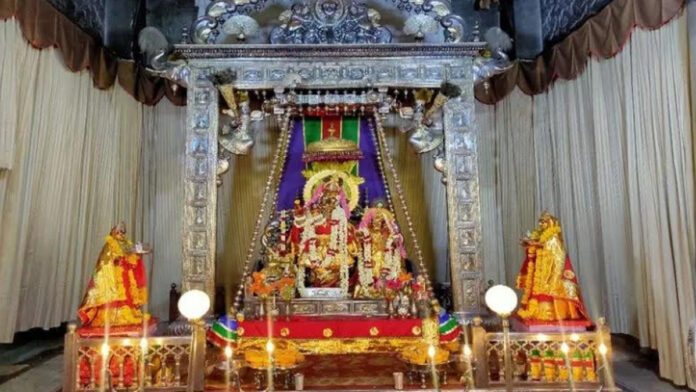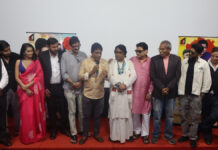Jaipur. Folk festival Sinjara was celebrated on Tuesday, the first day of Hariyali Teej in the capital Jaipur. During this, women applied mehendi and did sixteen adornments. On the other hand, Sinjara was sent from in-laws’ house for the newly married women. In which chunari, jewelry, clothes, ghevar, sweets and fruits etc. were sent. Also, on Wednesday, the royal procession of Teej Mata will be taken out from Tripolia Gate.
Women have started preparations for the Teej festival. The festival of Sinjara was also celebrated on Tuesday in the city’s revered deity Govind Dev Ji temple. On this occasion, Thakur ji was specially decorated and red mehendi was applied. During the tableau of Sinjara, Thakur ji was made to wear a black colored lappa jama dress.
Temple Mahant Anjan Kumar Goswami said that a special tableau of Thakur ji has been decorated on the occasion of Sinjara. Kheer-Ghevar was offered in the Rajbhog tableau at Govinddevji. Kheer and Ghevar were offered to Thakurji in the Laxminarayan Baiji temple in Badi Chaupad. Mehndi was applied to the mother. Along with this, she was made to wear a Chundari dress. Sinjara was celebrated in the Anand Bihariji temple in Chandni Chowk. Ghevar was offered to Radhaji. Along with this, Mehndi was also applied.
Kheer and Ghevar were offered to the Lord in the Radha Damodar temple located in Chaura Rasta, Radha Gopinath Ji temple located in Purani Basti, Laxminarayan temple located in Badi Chaupad and Saras Nikunj located in Panon Ka Dariba. Hariyali Teej will be celebrated on Wednesday. On this occasion, the worshipable deity Govind Dev ji will also give the message of environmental protection to his devotees. On this day, all the Govind devotees coming to visit the temple will be made to take a pledge to get religious benefits by planting as many trees as possible under the environment festival named Ek Ped Desh Ke Naam.
Tulsa Mata will be worshipped in the temple and circumambulation will be done. The visitors coming to the temple will also be able to circumambulate Tulsa ji. Also, 1100 Tulsi plants will be distributed free of cost during Dhoop Jhanki. On behalf of the temple, Panchayati Raj and Education Minister in Rajasthan Government, Madan Dilawar will plant 11000 plants under Paryavaran Mahotsav. These will be planted in different parts of the state.
Married women will worship Teej Mata for unbroken good fortune
The folk festival Hariyali Teej will be celebrated with great joy on Wednesday. On this day, married women will wear lehriya and worship Teej Mata for unbroken good fortune and will offer delicacies. Here, unmarried girls will worship Mata Gauri for the wish of a good groom and happiness and prosperity.
Teej Mata’s two-day royal procession will start from City Palace
Teej Mata’s two-day royal procession starting from City Palace will start on Wednesday and Thursday. On the occasion of Teej, a royal procession will be taken out from Tripolia Gate on Wednesday and Thursday from City Palace. On the day of Teej, members of the royal family will worship Teej Mata in the palace itself. After this, Teej Mata’s traditional procession will start from Tripolia Gate (City Palace) and will reach Talkatora via Tripolia Bazaar, Chhoti Chaupad, Gangauri Bazaar, Gangauri Darwaza.
In this Teej Mata procession, famous folk artists will be seen bringing Rajasthani culture to life by performing traditional dances and presentations like Kaachi Ghori, Kalbelia, Bahrupiya, Algoja, Gair, Chakri etc. Cannon carriage, decorated chariots, horses and camels will also be included in the procession. Along with this, a group of women carrying Kalash in traditional dress and a horse mounted police team will also be seen walking right behind the Teej procession. Thousands of domestic and foreign tourists will gather to see the royal procession. The next day, on Thursday, a royal procession will be taken out in the form of Budhi Teej.
The capital city smells of Ghevar
On the Sinjara festival, the capital Jaipur smells of the fragrance of Ghevar and artisans were seen making Ghevar at shops all around. Mass Sinjara festivals were organized by women’s organizations. Crowds of people buying Ghevar were seen in Jaipur’s markets as well as other markets. Apart from this, the markets were bustling with people buying Sinjara items.





